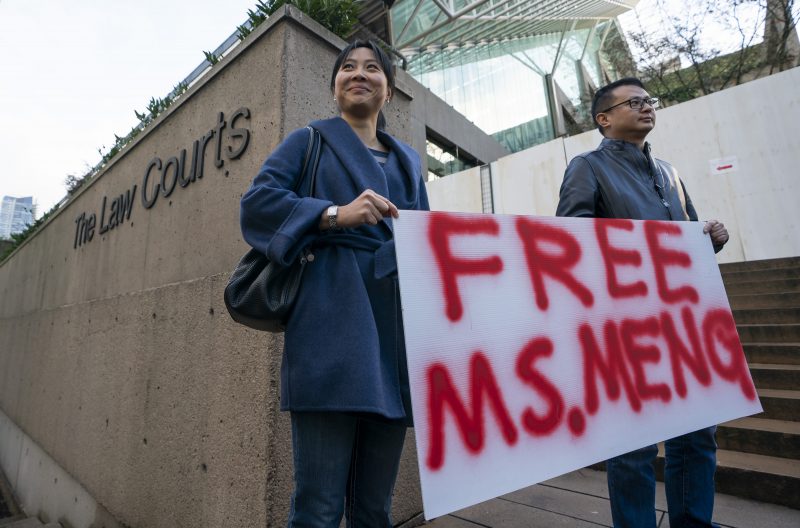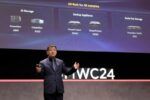Canada begins extradition of top Chinese executive to US
Supporters protest outside the bail hearing for Huawei Technologies CFO Meng Wanzhou, who was arrested on December 1 2018 as she changed planes in Vancouver (Rich Lam)
Ottawa (AFP) – Canada began extraditing Huawei executive Meng Wanzhou to the United States on Friday, the latest move in a case that has roiled relations between the North American neighbors and China.
The 47-year-old businesswoman was changing planes in Vancouver in December when she was detained at Washington’s request on suspicion of violating US sanctions on Iran — sparking arrests of Canadians in China that were seen as retaliatory.
“Today, Department of Justice Canada officials issued an Authority to Proceed, formally commencing an extradition process in the case of Ms. Meng Wanzhou,” the government said in a statement.
Meng, Huawei’s chief financial officer, is due in court on March 6, where prosecutors will present the evidence against her and lay out detailed arguments for her extradition.
The decision, the statement said, followed a “thorough and diligent” review which found sufficient evidence to warrant putting the matter before a judge.
At the end of the process — which could last months, or even years — Canada’s attorney general will have the final say on whether or not to hand Meng over.
The daughter of Huawei founder and former army engineer Ren Zhengfei, Meng has been released on bail pending the outcome of the hearings.
China reacted furiously to the US charges, saying they were the product of “strong political motivations,” and an attempt to undermine its flagship telecoms company.
The company also strenuously denied any wrongdoing.
– Canadians detained –
Nine days after Meng’s arrest Chinese authorities detained two Canadians — former diplomat Michael Kovrig and businessman Michael Spavor — in what was widely seen as an act of retaliation.
A third Canadian, meanwhile, had his sentence for drug trafficking upped from 15 years in prison to death row.
Canadian Prime Minister Justin Trudeau has insisted on a strict hands-off approach to the issue, his justice department stressing on Friday that “Canada is a country governed by the rule of law.”
Trudeau sacked his ambassador to China for undermining that position by saying Meng had a “strong” case against extradition, and later adding that it would be “great for Canada” if the US dropped the case.
In January, the US announced 13 charges against Meng, Huawei and two affiliates. Officials separately filed 10 charges against two Huawei affiliates for allegedly stealing technology from T-Mobile.
Prosecutors say that between 2007 and 2017, Meng, Huawei and subsidiaries sought to mask their business with Iran in violation of US and UN sanctions on the country.
Meng in particular “repeatedly lied” to bankers about the relationships between the companies, especially with Skycom, a Huawei affiliate in Iran, according to the charges.
That broke the law, justice officials in Washington said, because the Iran business involved US dollar transactions processed by banks through the United States.
Huawei and the affiliates lied to US authorities and obstructed the investigation, according to the charges.
The company is also accused of a concerted effort to steal technology related to a phone-testing robot dubbed Tappy from a T-Mobile USA lab in Washington state, and of rewarding staff for stealing competitors’ technology secrets.
Disclaimer: This story is published from a syndicated feed. Siliconeer does not assume any liability for the above story. Validity of the above story is for 7 Days from original date of publishing. Content copyright AFP.


